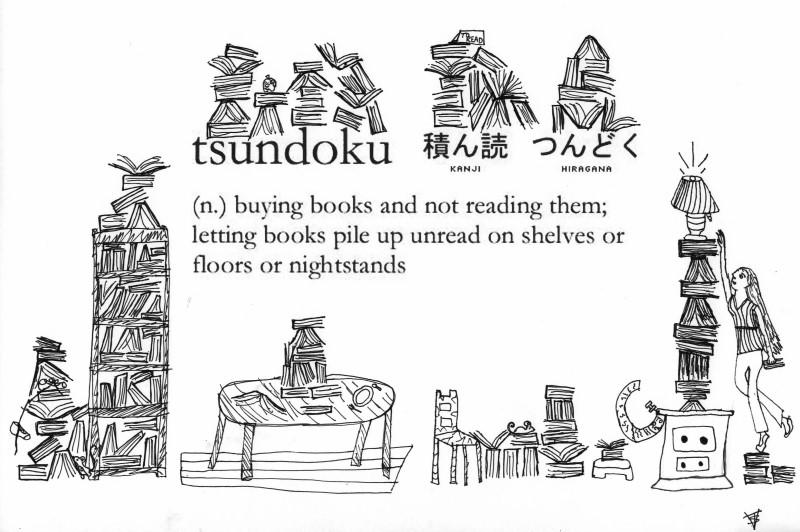
There are some words out there that are brilliantly evocative and at the same time impossible to fully translate. Yiddish has the word shlimazl, which basically means a perpetually unlucky person. German has the word Backpfeifengesicht, which roughly means a face that is badly in need of a fist. And then there’s the Japanese word tsundoku, which perfectly describes the state of my apartment. It means buying books and letting them pile up unread.
The word dates back to the very beginning of modern Japan, the Meiji era (1868–1912) and has its origins in a pun. Tsundoku, which literally means reading pile, is written in Japanese as 積ん読. Tsunde oku means to let something pile up and is written 積んでおく. Some wag around the turn of the century swapped out that oku (おく) in tsunde oku for doku (読) – meaning to read. Then since tsunde doku is hard to say, the word got mushed together to form tsundoku.
As with other Japanese words like karaoke, tsunami, and otaku, I think it’s high time that tsundoku enter the English language. Now if only we can figure out a word to describe unread ebooks that languish on your Kindle. E‑tsundoku? Tsunkindle? Visit our collection of Free eBooks and contemplate the matter for a while.
The illustration above was made when Redditor Wemedge asked his daughter to illustrate the word “Tsundoku,” and she did not disappoint.
Note: An earlier version of this post appeared on our site in July 2014.
If you would like to sign up for Open Culture’s free email newsletter, please find it here. Or follow our posts on Threads, Facebook, BlueSky or Mastodon.
If you would like to support the mission of Open Culture, consider making a donation to our site. It’s hard to rely 100% on ads, and your contributions will help us continue providing the best free cultural and educational materials to learners everywhere. You can contribute through PayPal, Patreon, and Venmo (@openculture). Thanks!
Related Content:
Learn 46 Languages Online for Free: Spanish, Chinese, English & More
Jonathan Crow is a Los Angeles-based writer and filmmaker whose work has appeared in Yahoo!, The Hollywood Reporter, and other publications. You can follow him at @jonccrow. And check out his art blog Veeptopus.


About 10 years ago I moved and the enormous amount of books 📚 that I had (8 full boxes) I donated to a local library. I kept about 20-something books that I hadn’t read and thought that was a lot.
I then bought a Kindle and started downloading books whether I had time to read them or not. I have amassed about 1500 books of which about 100–150 I haven’t had the time to read. That number could be higher! But I just can’t resist a good book if I see it! One of these days I’ll catch up!
This never happens in my house.
You call it “book hoarding” in English. Cut it out with the weird fetishization of Japan.
ONE OF MY FAVOURITE WORDS IN JAPANESE:
hiragana いっしょうけんめい, romaji isshōkenmei)
MEANING1. for dear life; as hard as one can; to the best of one’s ability
I love this single word that sums up so much meaning & emotion.